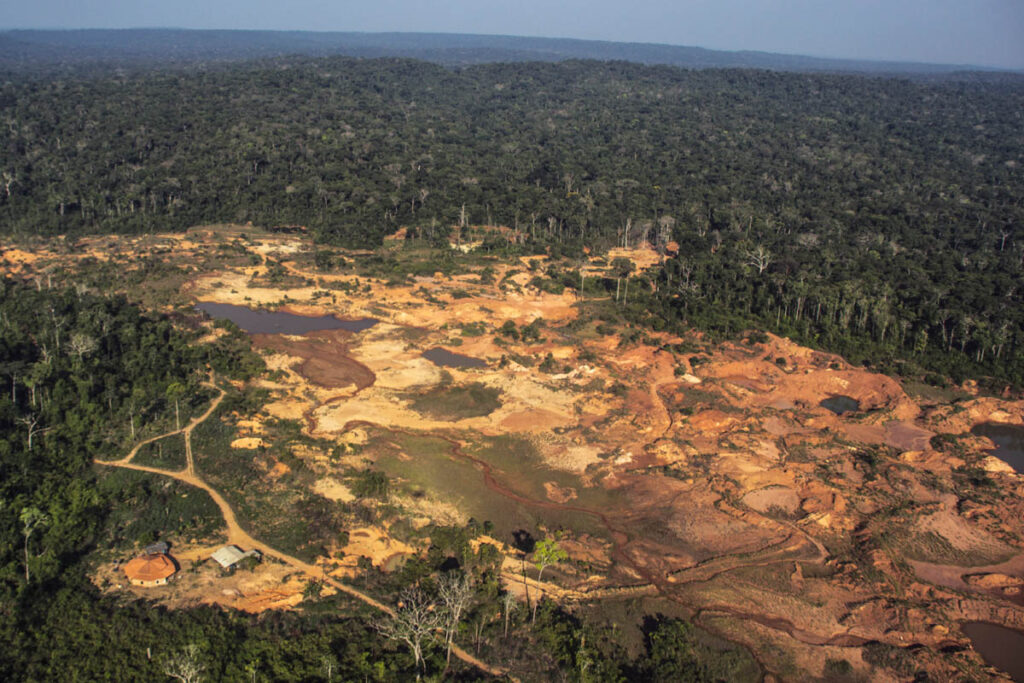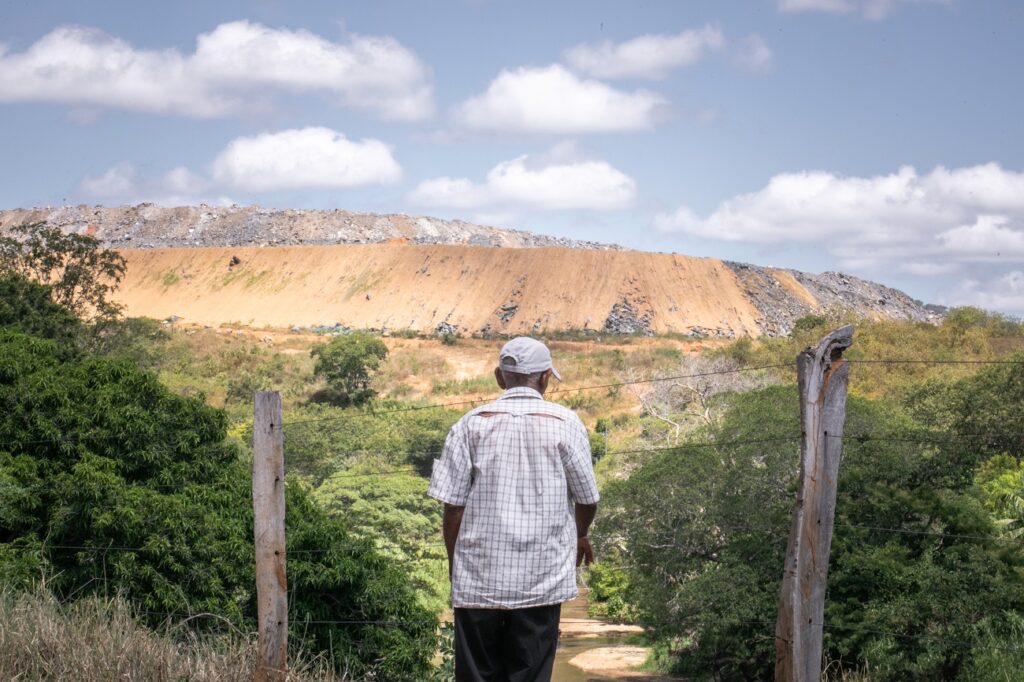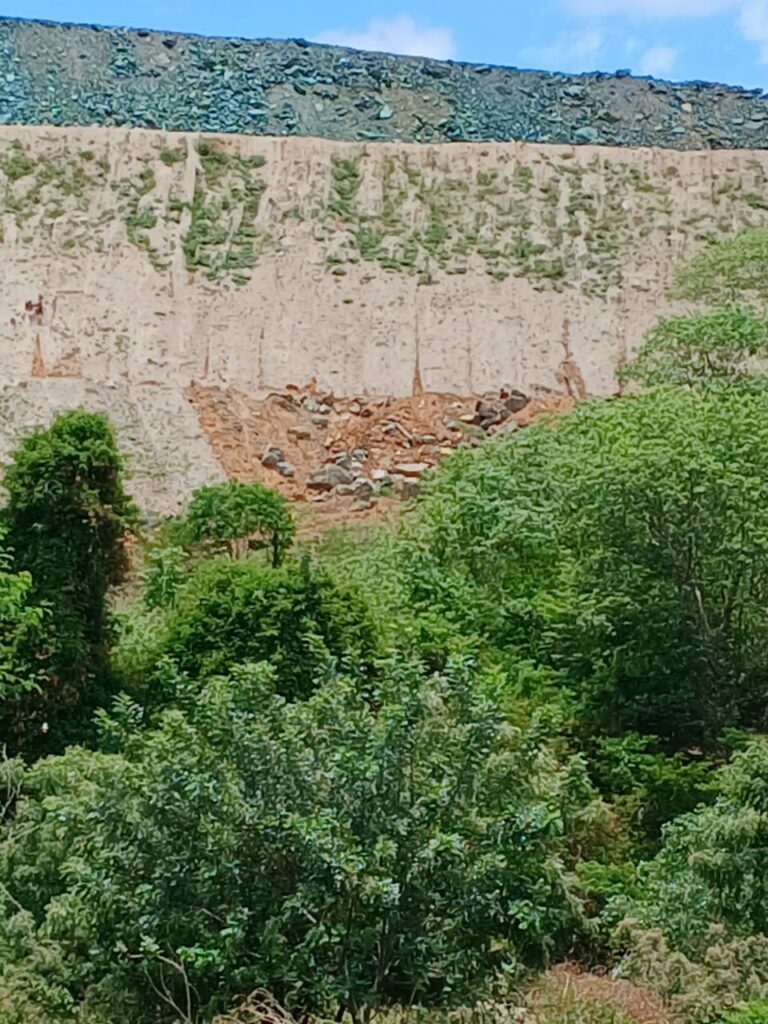Original story by Sandra Silva for Mining Observatory
Editing by Maurício Angelo
Translated by Roberto Cataldo/Mongabay
- Canadian mining company Aura Minerals plans to establish a major gold extraction project in Brazil’s Tocantins state without hearing the Quilombola (slave descendant) community that will be affected by the operations, thus violating their right to free, prior and informed consultation.
- So far, the company has not been transparent toward the community and has not described the potential impacts.
- Meanwhile, Aura Minerals has seen its value rise nearly 700% on the Toronto Stock Exchange between 2019 and 2022 — the best performance among 3,500 listed companies.
- The Quilombola estimate that, in the event of an accident with the company’s dam, the Baião community would be instantly engulfed and would disappear completely, with no chance to react.
Canadian mining company Aura Minerals has celebrated high profits in recent years, with record gains on the stock exchange. Meanwhile, the Quilombola community of Baião, in Almas, Tocantins state, which will be directly affected by the company’s new gold mining project, had their right to prior consultation ignored.
Aura Minerals’s value increased by almost 700% between 2019 and 2022 on the Toronto Stock Exchange — the best performance among 3,500 companies. The reason for such extraordinary performance is simple: The company pays investors extremely well.
Residents of Baião — located a little more than 3 miles away from the mining site — in turn, were not heard in the decision to resume the project that used to belong to mining company Vale.
The open-pit mine is located near the community and will affect them directly. That includes the Riachão, the only river to cross the Quilombola territory, which will be used by the company.
The quilombo’s residents estimate that, in the event of an accident with the dam used by the company, the Baião community would be instantly engulfed and would disappear completely, with no chance to react.
“The company claims that they are not in our territory, but do they have an escape route to save the territory if the dam collapses? The other communities will be affected in terms of water, social life, fauna and flora, but Baião risks disappearing,” Maryellen Crisóstomo said to the Mining Observatory.
Crisóstomo is one of the leaders of quilombo Baião and serves as head of communication for the National Coordination of Rural Black Quilombola Communities (CONAQ).
First image: Aura Minerals project in Almas
The Mining Observatory does not accept advertisements from mining companies, lobbyists and politicians. Therefore, it needs readers to continue investigating what the mineral sector does not want society to know and to offer free access to the articles. Make a one-time or recurring donation on PayPal.

Quilombola people are entitled to prior consultation
The Tocantins State Public Defender’s Office (DPE/TO) paid a technical visit to Baião in December 2022 to confirm the mining company’s lack of dialogue with locals.
Despite being so close to the site, the Quilombola were not consulted about the impacts of mining in the region.
Indigenous and traditional peoples’ right to free, prior and informed consultation is provided for by Convention 169 of the International Labor Organization. In Brazil, that right has been guaranteed by law since 2004.
That means that the Brazilian state must consult Native and traditional peoples about enterprises and infrastructure works with potential to cause impacts on territories, cultural practices and social dynamics of the communities affected by the activities.
The consultation must be transparent so communities understand the potential impacts on their lives. It must take place without pressure, respecting the timing, doubts and decisions of communities consulted.
In 2021, the Quilombola from Baião finished a protocol in which they detailed how the consultation should be conducted.
Nobody explained to the community the project’s context
To avoid having their doubts and concerns ignored, residents of Baião appealed to the Federal Prosecution Service in Tocantins (MPF/TO) in September 2021.
In a demonstration, the Quilombola reported the arbitrary way in which Aura Minerals approached the community in July of that year, coercing them to answer questionnaires with personal information, claiming that the questionnaire was “just like IBGE’s” [The Brazilian Institute of Geography and Statistics, which conducts census surveys], without informing them of its purpose.
The community refused to fill out any forms and turned to the Prosecution Service, which questioned Brazil’s National Mining Agency, the Palmares Cultural Foundation and the National Institute for Colonization and Agrarian Reform (INCRA).
A 10-day deadline for feedback was set in August 2022, but the agencies had not responded by February 2023.
Regarding the delay in the process, the Prosecution Service claimed that it was looking into the facts, and it needed concrete data in order to make any decision. “If the impact on the Quilombola community is proved, appropriate lawsuits will be filed,” says a representative.
In search of alternatives, the community resorted to the DPE/TO, which mediated a meeting on Jan. 11 with representatives of the Quilombola communities of Baião and Poço Dantas, from Almas, as well as Lajeado, Dianópolis and São Joaquim from Porto Alegre.
In addition to the Quilombola, the meeting included the State Coordination of Quilombola Communities of Tocantins, the Department of Environment and Tourism of Almas, the Rural Development Institute of Tocantins and Aura Almas Mineração, the Brazilian subsidiary of the Canadian mining company.
However, the meeting was not attended by technical staff from the mining company who could start a dialogue and speak honestly about the potential impacts on communities and the risks posed by the dams. The company’s representatives only advertised the project’s alleged economic benefits. “I’m particularly scared by their failure to mention the critical part. That’s very dangerous,” said Crisóstomo, who was present at the meeting.
The residents were presented with a slide show on the advantages of mining in the region — contrary to what they had expected, which was the beginning of a transparent dialogue about the potential impacts on their communities. “The big question is: What is the real threat to our territory?” Crisóstomo said.

Project was approved despite warnings about environmental damages
The cornerstone of the venture was laid in December 2021, after a legal dispute.
The Tocantins Court of Justice suspended the injunction granted in May 2021, which allowed the operation of the mining company after the Tocantins state government claimed, through the state attorney’s office, that it posed environmental risks to the region.
In December of that year, everything changed. At an event, then acting Governor Wanderlei Barbosa granted Aura an environmental license to operate.
Aura’s CEO Rodrigo Barbosa told news portal G1 that the company had reached a “common understanding” with the state government on the value of the area where the project would be implemented — which is public land and belongs to the Mining Agency of Tocantins — regarding “its potential benefits” to the state.
When asked by the Mining Observatory to comment on the exact content of the “agreement,” the government of Tocantins did not respond. On Feb. 17, 2022, the State Court of Justice declared that 21 articles of the law on environmental licensing sanctioned in July 2021, during former Governor Mauro Carlesse’s administration, were unconstitutional.
In 2022, Carlesse was charged with corruption as a result of a Federal Police investigation that eventually led to his resignation and the withdrawal of his candidacy for the Senate. In February, he and other former members of his administration were indicted for spying after another police probe.

Aura has not spoken about the communities’ right to be consulted
Questioned by the Mining Observatory, Aura Minerals sent a generic statement, which does not respond to the specific questions about the case.
Regarding their lack of consultation with the Quilombola and the fact that they ignored the presence of nearby communities, possible socio-environmental impacts, in addition to safety and emergency protocols and the risks posed by the tailings dam, the company said it “promotes responsible and sustainable growth in its businesses and adopts the best safety and ESG practices” and that “it respects the culture and well-being of the communities where it operates, integrating best practices and environmental projects into its businesses and activities.”
More detailed answers were requested, but the company chose to maintain its position.
The mining company’s lobby is strong in the municipality. It promises a long-term enterprise with creation of jobs and an initial investment of 375 million reais ($71 million). “The proposals fascinate the local population,” said Crisóstomo.
The open-pit gold mine has an estimated useful life of 17 years and average production of 50,000 ounces a year , each ounce being equivalent to just over 28 grams. According to the company, the construction work will create 400 direct jobs and around 1,200 indirect ones.
Tax revenues for the municipality of Almas are estimated at 80.3 million reais ($15 million) under the systems known as Financial Compensation for the Exploitation of Mineral Resources (CFEM) and Service Tax (ISS). The state treasury should receive 30.3 million reais ($5.7 million) from CFEM and royalties.
In Brazil, in addition to Almas, Aura Minerals has copper and gold mining projects in the states of Rio Grande do Norte and Mato Grosso, and it also operates in Colombia, Mexico and Honduras. In an interview with newspaper O Estado de S.Paulo in September 2021 , Aura CEO Barbosa said that, despite the political turmoil and threats to democracy already underway at the time and which have worsened since then as a result of the Jan. 8 attacks, “gold is immune to any crisis in Brazil” and Aura would be an “option” for investors when “everything goes wrong” because its operations are based on the U.S. dollar and 80% of its revenues are in gold.
Lack of regularization drives conflict in territories
The Baião quilombo is certified by the Palmares Foundation and has been waiting since 2010 to be recognized as Quilombola territory by INCRA.
According to Crisóstomo, the “slow implementation of that policy gives rise to this type of violence and conflict in the territory. It’s not just about mining; it’s also about deforestation and silted rivers,” she argued. The Quilombola from Baião have documents proving their presence in the area since 1919.
Contacted by the Mining Observatory to comment on the delay in the process, INCRA said, “That is meticulous work, and no deadline can be established for the procedures.”
According to INCRA, the duration of each process depends on the level of complexity and includes factors such as the degree of difficulty in accessing cartographic, land, agronomic, environmental, geographic, socioeconomic, historical and anthropological information necessary to prepare the Technical Identification and Delimitation Report (RTID).
The factors listed by INCRA to explain why it takes so long to provide a quilombo with a land title include the number of properties in the territory, the size of the territory, problems notifying all holders of real estate in the territories during the stages when the RTID can be challenged and notifications will be issued for inspection and evaluation of their properties, land conflicts, total number of challenges as well as administrative and court appeals filed during the course of each process, budget/financial issues, time for legal proceedings to expropriate rural properties and other variables.
In 2017, aspiring presidential candidate Jair Bolsonaro declared that he would not allow demarcation of any Indigenous or Quilombola territory during his term in office. The promise was fulfilled with several budget cuts and the dismantling of agencies in charge of policies for Native and traditional communities.
In April 2022, INCRA had more than 1,800 open processes to regularize Quilombola territories. In August of the same year, the agency approved a rule that made it even more difficult to recognize Quilombola communities and, consequently, their rights over the territories.
The rule established that only communities with RTID would enjoy their territorial rights.
Under that rule, the research and studies necessary for a Quilombola territory to be recognized will only be carried out if funds are available. It also disregards the Quilombola’s right to consultation .

In addition to mining, community is surrounded by agribusiness
Living in the middle of the Agricultural Development Plan of Matopiba (an area comprising the Cerrado border of the states of Maranhão, Tocantins, Piauí and Bahia), the Quilombola from Baião are directly impacted by the advance of agribusiness and suffer from land-grabbing, deforestation, pesticides, silted rivers and water scarcity.
In order to access water, families that could not afford digging artesian wells depend exclusively on the municipality’s water trucks.
In their consultation protocol, the Quilombola say they fear they will have to leave the territory they have occupied for more than 90 years, with so many environmental destruction fronts around them.
It is by remaining in the territory that they guarantee that traditional farming practices, religion and ways of life keep persisting to this day.
Mining tends to make water even more scarce
The municipality of Almas, which is located in southeastern Tocantins — a region affected by water shortages — has been historically marked by slavery and the gold rush.
Paulo Rogério Gonçalves, technical director of civil society organization Alternatives for Small-Scale Agriculture in Tocantins, pointed out several factors making water scarce in the region.
“There is the impact of agribusiness in the Matopiba region, causing lack of water and the depletion of the Urucuia aquifer, which is lowering the water discharge that supplies the entire southeastern region of Tocantins,” he said.
Scientists confirm the views expressed by Gonçalves, aka Paulão. The advance of agribusiness based on large-scale irrigation may be one of the main drivers of the depletion of the Urucuia aquifer, an immense reservoir that lies below the plateaus and rivers impacted by large farms . Mining, which requires intensive use of water, may worsen the scenario.
The Quilombola issue is also historical in the region and is directly connected to mining.
The African diasporic population was trafficked to southeastern Tocantins to be exploited in the gold cycle of the 1700s. After that, several quilombos were established.
“Southeastern Tocantins is a large Quilombola territory of Black populations that don’t have any land title,” Gonçalves explained. “There is no conclusive action by INCRA to regularize the areas, and the state government refuses to regulate the Quilombola territories,” he said.
“It is a large Black population — almost an Africa in Tocantins — and none of these communities can enjoy their territorial rights,” Gonçalves concluded.
Fonte
O post “In central Brazil, canadian company Aura Minerals ignores quilombola concerns over gold project” foi publicado em 4th April 2023 e pode ser visto originalmente diretamente na fonte Observatório da Mineração




